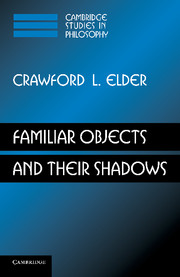Book contents
- Frontmatter
- Contents
- Acknowledgments
- Introduction
- 1 Two false friends of an ontology of familiar objects
- 2 Conventionalism as ontological relativism
- 3 Realism about material objects: persistence, persistence conditions, and natural kinds
- 4 Ontological preference for the temporally small
- 5 Ontological preference for microphysical causes
- 6 Ontological preference for the spatially small
- 7 A third false friend of familiar objects: universal mereological composition
- 8 Concluding Hegelian postscript
- Appendix: “Mutually interfering” dimensions of difference
- References
- Index
8 - Concluding Hegelian postscript
Published online by Cambridge University Press: 25 January 2011
- Frontmatter
- Contents
- Acknowledgments
- Introduction
- 1 Two false friends of an ontology of familiar objects
- 2 Conventionalism as ontological relativism
- 3 Realism about material objects: persistence, persistence conditions, and natural kinds
- 4 Ontological preference for the temporally small
- 5 Ontological preference for microphysical causes
- 6 Ontological preference for the spatially small
- 7 A third false friend of familiar objects: universal mereological composition
- 8 Concluding Hegelian postscript
- Appendix: “Mutually interfering” dimensions of difference
- References
- Index
Summary
HEGEL AND CONTEMPORARY SCEPTICISM ABOUT FAMILIAR OBJECTS
Contemporary metaphysicians are deeply sceptical of the familiar objects recognized by common sense and by many empirical sciences. What explains the scepticism? I shall begin this chapter by suggesting that contemporary metaphysics is dominated by the style of thought which Hegel – using the nineteenth-century vocabulary of faculties – called “the Understanding,” and that “the Understanding” is constitutionally antipathetic to familiar objects. But first a few words about the style of thought that finds familiar objects congenial – the style of thought which Hegel identified under the title “Reason.”
A prime characteristic of “Reason” is that it is willing to recognize what Hegel called “identity in difference.” “Identity in difference” is a form of sameness which articulates itself in difference. One example is the sort of persistence that seems to characterize familiar objects. Typically, a familiar object goes on being itself while passing through different phases or properties, that is, while differing from itself. Indeed in many cases – and especially if we count such properties as age among the relevant ones – a familiar object can go on being numerically the same object only by differing more and more from its earlier self. Another example is the relation of a familiar object to its parts. One and the same familiar object comprises different parts at different times; in the particular case of organisms, a familiar object can go on being itself only by expelling former parts and adding new ones.
- Type
- Chapter
- Information
- Familiar Objects and their Shadows , pp. 166 - 189Publisher: Cambridge University PressPrint publication year: 2011



